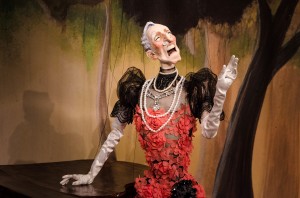With each performance, Canadian puppeteer Ronnie Burkett returned to a single stage to select from more than 30 handmade marionettes on standby for the night’s audience.
It has been a little less than a year since the Center for the Art of Performance at UCLA first introduced the L.A. community to Burkett and his Theatre of Marionettes with “Penny Plain.”
Over the weekend, Burkett returned to Los Angeles for a four-night stay at the Actors’ Gang at Ivy Substation in Culver City. Burkett performed his original work “The Daisy Theatre,” co-commissioned by the Center for the Art of Performance at UCLA.
Unlike the narrative arc of “Penny Plain,” which remained play-like in structure, the vaudeville-style of “The Daisy Theatre” production changed for every show. Burkett’s marionettes waited in the rafters to come to life, as he selected members of the rotating cast for speeches, variety acts and musical performances on center stage.
A touring puppeteer since age 14, Burkett opened the evening explaining the improvisational style of the following show. Only his three favorite characters would definitely take the stage: a hopeful fairy named Schnitzel, a past-her-prime showgirl named Esme Massengill and a small-town widow named Edna Rural.
Aside from that, Burkett engaged the audience for the following two hours with little plan or direction. At most of his highs, Burkett made good use of the over-18 age requirement. Burkett piled on sexual innuendos and politically incorrect one-liners from his rafter above, with puppet asides and dirty dance moves that even made himself giggle. The audience was treated to a facetious opera singer and drag army general, among other characters.

(John Lambert and Associates)
While the majority of the audience was past middle age, Burkett had the crowd entranced, laughing or sighing along with the characters’ ups and downs, spurring on their favorites with the occasional heckle. Burkett played with his audience, often capitalizing on the “power” of the fourth wall by breaking it as he drew upon audience members as his assistants and props. More often than not, these typically male recruits also served as fuel for more dirty jokes and bare skin.
For most of the evening, Burkett showcased the entertainment value of his production – a theatergoer’s requirement that he mocked. However, many of Burkett’s storylines also evoked larger, more thoughtful themes of hope, love and death. The widowed Edna Rural seemed to transparently reflect Burkett’s own fears of the impermanency of location and life.
As Schnitzel told the audience that he loved them and sang farewell with a lullaby, the standing ovation seemed to demand Burkett’s return next year, which really can’t come too soon.
– Natalie Green
